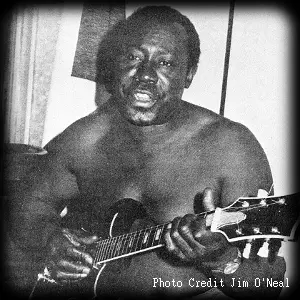BLUE SMITTY
 The Blues is a hybrid animal, absorbing elements and influences from all around and incorporating them into new and progressive styles of music. Individual musicians absorb the influences of others, consciously or otherwise, and sometimes they even openly steal others work to present as their own. This is just the way it has played out since the origins of the Blues, but it leaves some tremendous talents standing on the sidelines wondering why they are not in the game. One such character is ‘Blue Smitty’, a powerful singer and guitarist who made a great contribution to the transformation of the Blues from acoustic to electric music in Chicago just after WWII.
The Blues is a hybrid animal, absorbing elements and influences from all around and incorporating them into new and progressive styles of music. Individual musicians absorb the influences of others, consciously or otherwise, and sometimes they even openly steal others work to present as their own. This is just the way it has played out since the origins of the Blues, but it leaves some tremendous talents standing on the sidelines wondering why they are not in the game. One such character is ‘Blue Smitty’, a powerful singer and guitarist who made a great contribution to the transformation of the Blues from acoustic to electric music in Chicago just after WWII.
‘Date Bait’ has been covered many times, but didn’t even get a release from Chess!
Smitty’s association with Muddy got him some session work at Chess Studios over in Chicago, and he recorded four of his own songs for them in July 1952. ‘Sad Story’ c/w ‘Crying’ were issued as a single, but the company had bigger stars to promote when Little Walter‘s ‘Juke’ hit the top of the Billboard R&B charts the next month, and nothing more was released. All those original tracks feature Smitty’s confident voice and accomplished guitar lines, and they are frequently included in compilations as fine examples of classic electric Chicago Blues. Smitty’s career did not take off, and although he continued to play around Illinois for many decades, and although he gave some great interviews in Living Blues magazine in the 70s, his talent was never picked up by a record company or Festival promoter. He passed away in Joliet in 2007.
Blue Smitty Discography
Smitty’s songs are included on many compilations like ‘Drop Down Mama’ and ‘Chess Masters’, and his songs ‘Sad Story’, ‘Crying’, ‘Elgin Movements’ & ‘Date Bait’ are available on Spotify, but watch out for all those other Smittys!